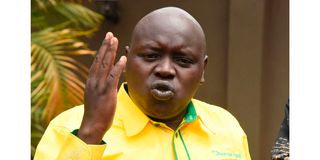Ruto handlers move to end Rift MPs dissent on maize

Nandi Senator Samson Cherargei. He is among leaders opposed to plans to import 10 million bags of maize.
President William Ruto’s handlers have moved to silence lawmakers from his Kenya Kwanza Alliance who have criticised his administration’s decision to import 10 million bags of maize.
Most of the MPs who have protested the importation are from President Ruto’s UDA and his Rift Valley backyard.
Lawmakers who have opposed the plan include senator Samson Cherargey (Nandi) and Allan Chesang (Trans Nzoia), and MPs Didmus Barasa (Kimilili), Phyllis Bartoo (Moiben), Timothy Toroitich (Marakwet West), Julius Rutto (Kesses), Maryanne Kitany (Aldai), Josses Lelmengit (Emgwen), Janet Sitienei (Turbo), Abraham Kirwa (Mosop) and Pokot South’s David Pkosing.
The legislators termed the importation a deliberate move to cripple the agriculture sector.
Yesterday, the Nation established that the lawmakers’ presser did not augur well with the Executive, with some of the first term MPs being called by “powerful” individuals around the Head of State.
Multiple interviews revealed that majority of them have now decided to go slow on the matter as well as withdraw support for plans to impeach Trade Cabinet Secretary Moses Kuria, who announced the importation plan.
Those who were called by President Ruto’s handlers were told that they were providing fodder to the opposition to fight the government.
“A number of us were called by the big man’s handlers on Tuesday night. They did not take the press conference we had lightly,” said one of the MPs who did not want to be named.
“Going forward, we have decided that we will not go to the extreme. We will handle the matter with a lot of moderation. At least our voice has been heard and our people know very well that we stood by them even if we will not comment on the matter again,” added the MP.
The lawmakers are afraid of falling afoul of President Ruto, which could be injurious to their political careers.
“We do not want to be in the firing line of the big man because we still need more support from him in terms of development,” said a first term MP. This was corroborated by another MP who said that his colleagues were asked why they were contradicting the government when they are part of the ruling coalition.
Mr Cherargei, who kicked off the opposition of the maize importation, yesterday did not want to comment on the latest development.
President Ruto’s administration faces a tough balancing act between importing 10 million bags of genetically modified (GM) maize to lower the cost of flour and protecting local farmers.
Belgut MP Nelson Koech, a senior member of President Ruto’s inner-circle, yesterday said that both the government and those opposing the importation of the maize are right, while describing their actions as “competing interests”.
At the same time, the Council of Governors has faulted the manner in which the government lifted the ban on GM maize, saying it was hurried and they were not consulted.
“The discussion on importation of GMO was premature as a report on the maize balance sheet by the Ministry of Agriculture and Livestock Development projects a maize surplus of 19.1 million bags by end of December 2022,” said Bungoma Governor Kenneth Lusaka, who is the council’s Agriculture committee chairperson.
Trans Nzoia Governor George Natembeya said that GMOs not only threaten the livelihoods of small-scale farmers, but also poses a health risk.





